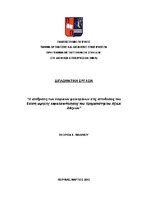Η επίδραση των καιρικών φαινομένων στις αποδόσεις του δείκτη υψηλής κεφαλαιοποίησης του Χρηματιστηρίου Αξιών Αθηνών

View/
Subject
Stock market ; Χρηματιστήριο Αξιών Αθηνών ; Κεφαλαιαγορά ; ΕπενδύσειςAbstract
The process of making decisions when faced with emotions is very complex in humans. Emotions can become a negative influence in humans’ judgment especially when factors like risk and uncertainty are involved. According to behavioral finance literature humans do not always make rational investment decisions. Recent economic research have also revealed a weak but significant relationship between emotions/behavior and weather phenomena. Weather is considered to be a proxy for the mood factors that affect the decisions of investors and traders. It has been proved that investors tend to be more optimistic about the market prospects when the weather is warm and sunny which in turn lead to more stock investments while the exact opposite results concur when the rainy and cloudy days reveal a more pessimistic side of investors personality. The main purpose of this thesis is to investigate the hypothesis that investing behavior and consequently stock market returns are affected by weather changes. Rejection of this hypothesis supports the view that stock market anomalies reflect nothing but economic information and as a result no correlation with weather variables is presented. In order to complete this investigation some crucial data have been used. The daily weather data have been provided by the National Meteorological Service of Greece for a time period of ten years from 1/1/2005 to 31/12/2011 and they strictly concern the area of Athens. As for the daily equity returns, those data have been provided by Bloomberg’s database and refer to the Stock Exchange Market of Athens. In this study the research methods that have been used include the correlation analysis tests along with the regression analysis models via the Eviews 7 software. Results indicate a possible influence of humidity on the economic decisions of stock investors. This finding is reported as evidence for future research on this field. Overall the results obtained do not constitute sufficiently strong evidence of a systematic effect of weather conditions on equity returns of the Athens Stock Exchange. This result can only lead us to the conclusion that some other factors rather than weather conditions are responsible for the daily volatility of equity returns and consequently for the stock market performance in general.


